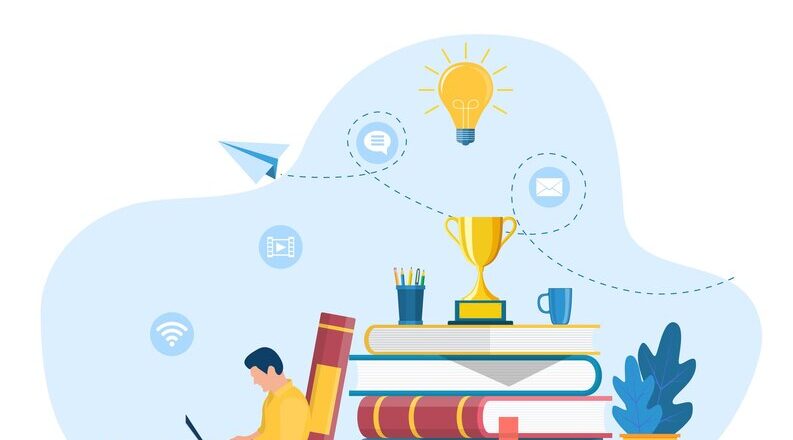When we think of learning, our minds often drift to the formal education we receive in schools, colleges, and universities. The narrative ingrained in us from an early age emphasises the importance of ‘getting a good education’ as a stepping stone to securing better jobs, earning more, and achieving success in our chosen careers. While formal education undoubtedly plays a crucial role, it is just one facet of a broader concept – lifelong learning.
Lifelong learning extends beyond classrooms and degrees, encompassing a myriad of opportunities to expand knowledge and develop skills throughout one’s life. It transcends the boundaries of academic pursuits, becoming a deliberate and voluntary act fuelled by a positive attitude towards personal and professional development.
The Dual Facets of Lifelong Learning
Lifelong learning is fuelled by two primary motivations: personal development and professional growth. These two dimensions often intertwine, with personal development enhancing employment opportunities and professional development fostering personal growth.
Engaging in continuous learning for personal development offers a plethora of benefits:
Boosts Confidence and Self-Esteem: Acquiring new knowledge and skills contributes to a sense of accomplishment, boosting confidence.
Encourages Adaptability: Continuous learning makes individuals less risk-averse and more adaptable to change, fostering resilience in the face of evolving circumstances.
Enhances Personal Life: A commitment to learning enriches personal lives, offering more fulfilling experiences and broader perspectives.
Challenges Ideas and Beliefs: Lifelong learning encourages critical thinking, challenging existing ideas and beliefs, fostering intellectual growth.
Fun and Enjoyable: Learning, when pursued for its intrinsic value, can be a source of enjoyment and satisfaction.
Learning for Personal Development: Beyond Specific Goals
Lifelong learning for personal development need not have a predefined goal. It can be a rewarding experience in itself. Individuals may pursue learning for various reasons, such as:
Increasing knowledge or skills related to a hobby or pastime. Developing entirely new skills for personal enrichment, like taking a pottery or car mechanic course.
Researching a medical condition or ancestry.
Gaining insights into the history and culture of a travel destination. Moreover, the notion that continuous learning may stave off certain forms of dementia, while not conclusively supported by scientific evidence, underscores the cognitive benefits of an active and engaged mind.
Learning for Professional Development
In the professional realm, the capacity to earn is intricately tied to the willingness to learn. While formal education and qualifications may open doors, employers seek individuals with transferable skills and a demonstrated commitment to learning. The job market rewards those who continuously enhance their skills and knowledge.
Key strategies for leveraging learning for professional development include:
Unemployment Opportunities: During periods of unemployment, investing time in learning something new can lead to unforeseen opportunities.
On-the-Job Learning: Take advantage of training, coaching, and mentoring opportunities in the workplace to enhance continuous professional development.
Skill Hone and Specialisation: Continuous learning contributes to personal satisfaction and job enrichment, potentially leading to specialisation and increased earning potential.
From a financial standpoint, a highly skilled worker becomes an invaluable asset to companies, often resulting in faster promotions and associated salary increases. Additionally, expertise enhances one’s value not only to employers but also to customers.
A Framework for Effective Learning
Colin Rose, in his book “Master it Faster,” introduces the mnemonic MASTER, outlining six stages crucial for becoming an effective learner. These stages, applicable to any type of learning, formal or informal, are:
Motivation: Lifelong learning demands self-motivation, requiring a positive outlook and belief in one’s ability to learn.
Acquire: Effective learning involves acquiring information through diverse methods like reading, listening, observing, practicing, experimenting, and experiencing.
Search: Successful learning entails searching for personal meaning in acquired information, linking facts to personal context.
Trigger: As human memory is fallible, triggering recollection through note-taking, practice, discussion, and experimentation aids in reinforcing learning.
Examine: Regularly examining acquired knowledge reinforces understanding, encouraging an open mind and questioning.
Reflect: Reflection on the learning process, including feelings and insights gained, completes the learning cycle.
Embracing a lifelong learning mindset involves a continuous loop through these stages, fostering not only knowledge acquisition but also personal growth.
Lifelong learning serves as a compass in the vast landscape of personal and professional development. Whether unlocking the mysteries of a new skill or deepening expertise in a chosen field, the journey of continuous learning enriches lives, expands horizons, and positions individuals for success in an ever-evolving world.

